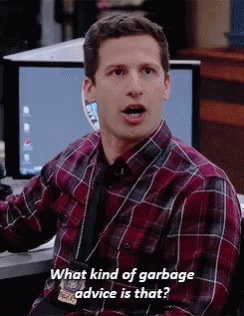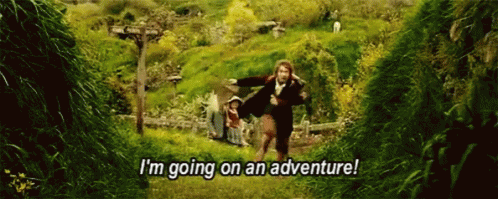
So, this is a bit of a sticky subject, because how the heck do you figure out what constitutes “good” writing advice? This subject can get extremely existential and abstract, so in an effort to bring it back down to earth, I’m going to share some of my own parameters for what I consider to be “good” writing advice. Ultimately, it comes down to this: is it helpful? Is it encouraging? And is it reputable?
After all, you don’t want to find yourself in this position:

Truly though, when you leave this post, I hope you have a slightly better idea of how to determine whether a particular piece of advice is useful to you or not, and how to find better advice when you need it.
Is it helpful?
Question one: does this piece of advice actually answer the question you were trying to answer? In fact, does it offer any answers at all? Sometimes, we get caught up in reading or listening or watching something and forget to reflect on whether we got anything of value from it or not.
Is it encouraging?
Question two: did you leave that workshop/podcast/youtube video/blog post/book feeling uplifted or down on yourself? Personally, I don’t find discouraging writing advice to be at all helpful, which is why this is one of my parameters. I need to be able to find inspiration, or at the very least, positivity in the writing advice I consume.
Is it reputable?
Question three: does the advice come from a trustworthy source? For example, are they someone established in the writing industry?
Now, this is not to say that amateurs can’t offer good advice, in fact they often do. Or to say that professionals don’t sometimes give bad advice, but what I am trying to say is that you ought to vet your sources. For example, say you’re trying to get advice on how to write poetry. Would you go to someone who hasn’t written a poem before in their life? What I’m getting at is this: do your research. Don’t take everything at face value, instead engage your critical thinking skills and figure out whether the thing you’re consuming is trusted among others you respect (for example an author you admire.)
So now that we know how to determine whether something is “good” advice or not, how do we go about finding said advice? I’m going to offer some tips below.
- The internet is your friend – it’s truly astonishing what you can find with just a simple google search, and once you apply the three parameters above, you should be able to narrow down the results.
- Libraries are your friend – the internet is great, but in my opinion, it’ll never beat a good book. Not to mention that most librarians contain a wealth of knowledge and are usually more than happy to help you find what you’re looking for.
- Writing blogs can be great resources – whether that’s The Plottery Blog, Reedsy, Jane Friedman, or Daily Writing Tips, and believe me, there are so many more. Some of these sites will also have newsletters that you can subscribe to if you want advice to just show up in your inbox!
- Ask your writer/editor/reader friends! Find someone you trust, maybe even someone whose style you like, and ask them where they get their writing advice from! You’d be amazed at what people are willing to share if you just ask.
Some writers also offer classes/workshops/seminars, like Maggie Stiefvater, So if there’s a particular author whose style you really admire, look into it and see if they have a blog or a course you can take part in!
Honourable mention to On Writing by Stephen King – this is a tried-and-true classic read for writers everywhere, and I highly recommend picking it up at some point.
It can be really confusing and overwhelming looking for writing advice, especially if you’re unsure of exactly what you need. Not to mention that it can be difficult figuring out what to trust. My rule of thumb is to figure out what you’re looking for first, and then take everything with a grain of salt. That said, hopefully these tips will give you a way to sift through the surplus of results and find something useful – remember to like/comment/share – especially if you have advice or resources of your own to add.
And with that, I leave you to your searching adventures.

Love,
Jules ❤
Jules
Written for The Plottery
Jules (she/they) is a queer, nonbinary, neurodivergent writer and aspirant book dragon who has been in love with writing since they were six years old. They are just as likely to wax poetic about philosophy or comedy specials, and they dream of someday escaping to a cabin where they can entertain their imagination, surround themselves with books, and hopefully gaze dramatically into the rain from a cosy window seat. They have their own blog chaoticallyinclined namely @jules.m.sherwood on Instagram.










